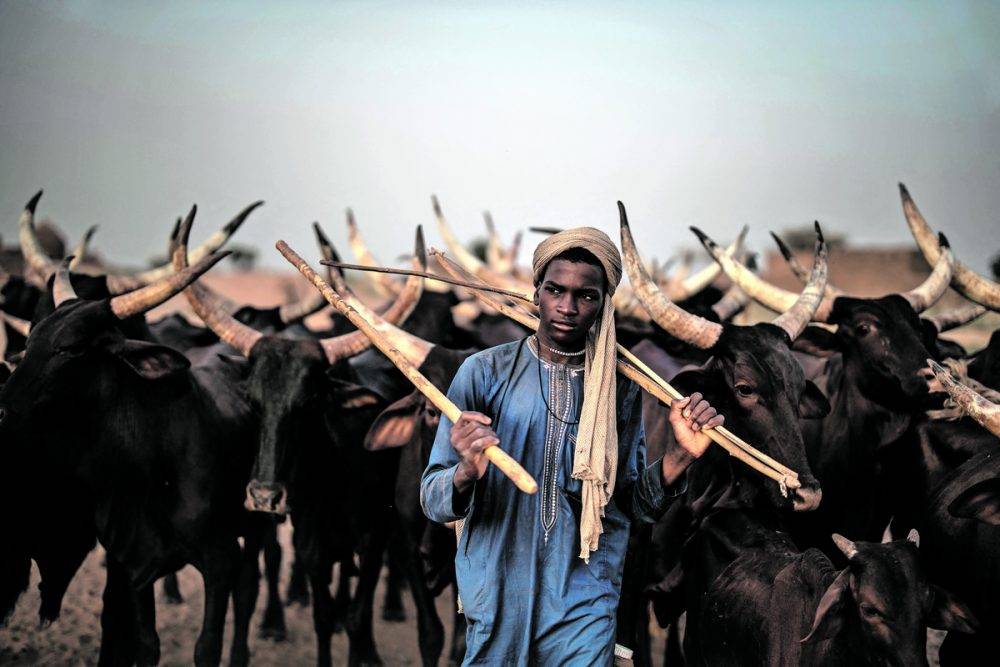
High and dry: Drought is prompting Niger’s Fulani herdsmen to graze cattle on the land of farmers, causing conflict. Photo: Marco Longari/AFP
In the border town of Gaya, a 69-year old Nigerien farmer waits for a long-distance truck to take him home. He holds on tight to a bag of fertiliser bought in neighbouring Benin.
Supplies in Niger have grown scarce since 2019 and became even more restricted after regional bloc the Economic Community of West African States imposed sanctions in response to the military coup in July.
“The coup brought everything to a standstill,” says Mamadou, speaking in the Zarma language. Food prices in the landlocked country rose by nearly 25% in the months of the sanctions, which were not lifted until February.
Long before the political crisis, food production in Niger began falling victim to the increasingly hostile environment, as the Sahara crept south and drought degraded the soil.
“Production decreased every harvest season until there was nothing coming out,” says Mamadou.
Many farmers have been forced to leave the country.
“But I am too old to leave,” Mamadou says.
Salimata, 35, was a farmer in Niger. She was young enough to leave. She is now a domestic worker in Benin.
“The problem with Niger is that the rain has totally disappeared, replaced by long months of drought.
“But when the rain comes, it brings floods which destroy crops. It is a hopeless situation,” she says.
Between August and September last year at least 50 people died in floods in Niger. The General Directorate of Civil Protection said more than 3 000 cattle were killed and 3.9 tonnes of food were destroyed.
Not that dry weather is much better, especially for livestock herders.
“Our cattle keep decreasing, dying one by one of hunger and thirst, due to lack of grazing space and water,” says Abou, a Fulani herder.
Searching for pasture, the herders push south, where agrarian Zarma people, such as Mamadou, farm.
It’s a recipe for conflict.
“My brother and I took our cattle to another region for grazing space but we ended up clashing with the Zarma and he almost lost his life.
“The only alternative is to leave this bewitched country,”Abou says.
He says a passeur — a human trafficker — will help him and his brother cross to Benin, then onwards to the Canary Islands in Spain.
They would join a steady stream of West Africans taking that dangerous journey to Europe. In the first six weeks of this year, 11 704 migrants reached the Canary Islands, leading the Spanish interior ministry to estimate that 70 000 would have entered by the end of this year, up from just under 40 000 last year.
Niger has stopped co-operating with the EU to stop migrants. In November, the new military government, led by Brigadier General Abdourahmane Tiani, repealed a 2015 anti-migration law.
But not everybody can pay a passeur to migrate. For the poorest families, the choices left are even more heartbreaking.
A farmer with 15 children and two wives says he gave up his two daughters, aged 15 and 17, for marriage.
“Our farm used to help us put food on the table. But now everything has fallen apart.
“I think my daughters will be better taken care of when married and it will alleviate our suffering,” he says.
Niger has one of the world’s highest rates of child marriages — 75% of girls are married before their 18th birthday and 28% before they are 15, according to advocacy group Girls Not Brides.
A fisherman on the river that separates Benin and Niger sees much of the despair around him as rooted in inaction about climate change.
He wants African governments to do more than simply attend environmental summits.
“Very good speeches are read, and commitments are made, but are not followed up on. Why always wait for the West and those big polluters to help us?” he says.
“They can start small with their own resources and improve the situation while waiting for the foreign powers.”
This article first appeared in The Continent, the pan-African weekly newspaper produced in partnership with the Mail & Guardian. It’s designed to be read and shared on WhatsApp. Download your free copy here
 (1).png)
 8 months ago
33
8 months ago
33


















